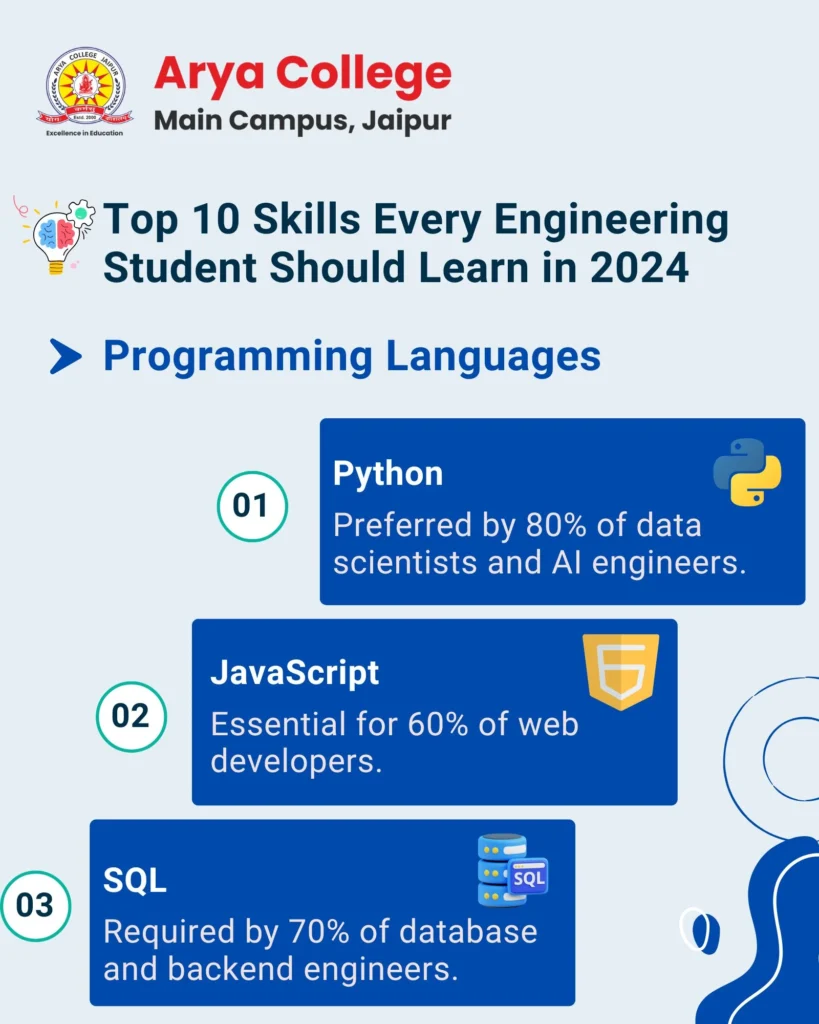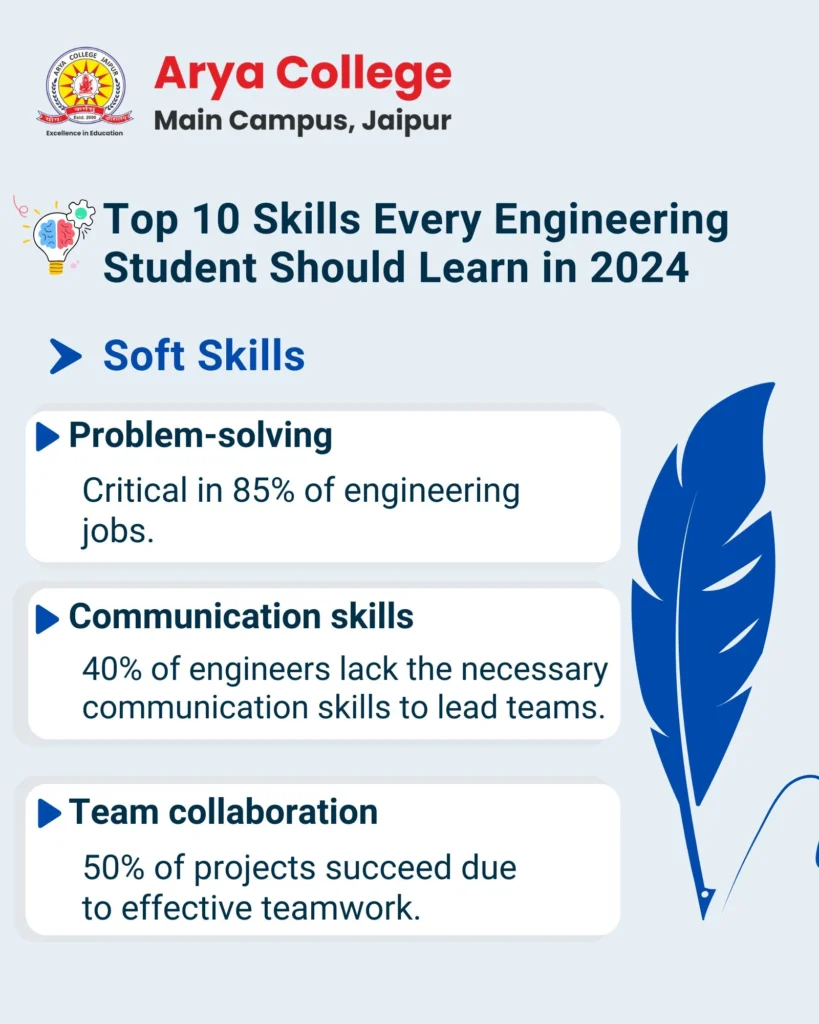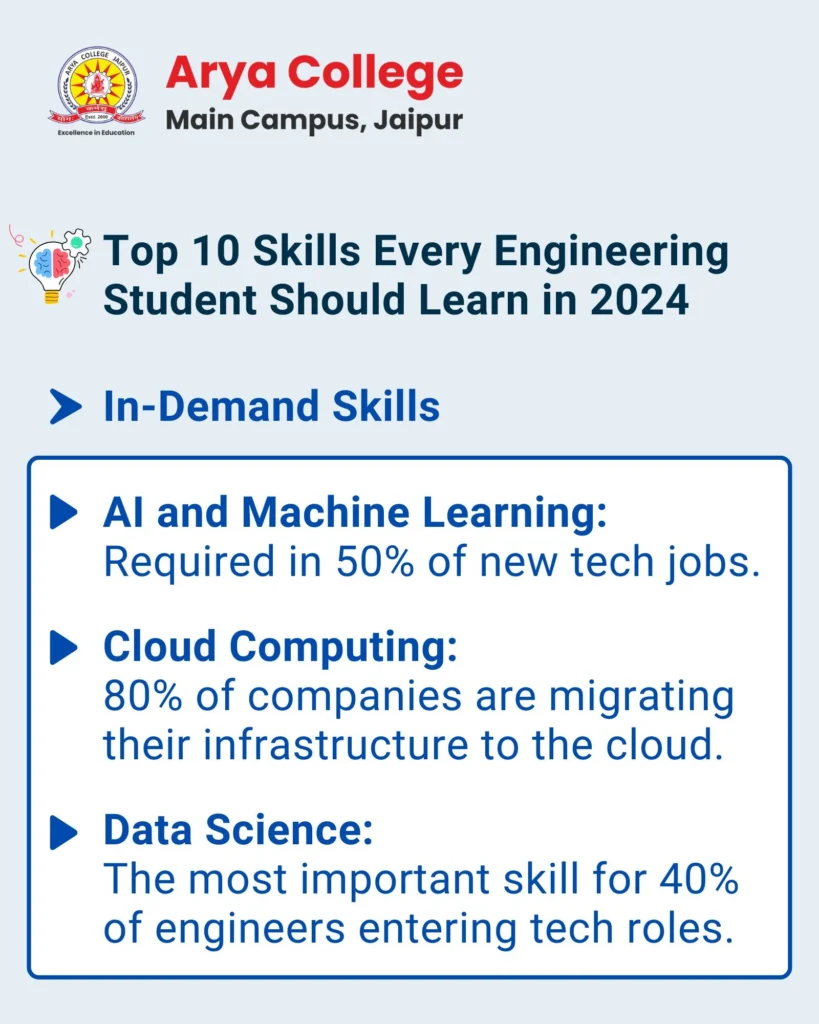How to Excel in Your Engineering Career: Top 10 Skills to Learn in 2025
With the fast-evolving world of technology, students of engineering have to upgrade continuously in order to be in the race. In mid-2025, there are a few very important skills that any engineering student must master so that their job prospects can be improved. The following paper discusses the top 10 skills a student of engineering should have, why these skills are so crucial, and how practically one can obtain them.
1. Why Engineers Should be Masters of Coding Language
Coding proficiency is a fundamental requirement for engineers and remains highly relevant in 2025.
Nowadays, it’s impossible to work as an engineer without having coding skills. It is supported by LinkedIn Learning’s report, which says that 65% of all engineering positions require above-average programming skills. Knowledge of Python, Java, and C++ can be a game changer in your career prospects and problem-solving capabilities.
Skills to focus on:
- Python: It is well known for its flexibility, and in that regard, it is indispensable for data analysis and machine learning.
- Java: Used in Web development and all Android applications.
- C++: This language is important for system programming as well as for developing games.

Most popular programming languages among engineers
2. The Role of Emerging Technologies in Engineering
Background: Understanding emerging technologies is an essential element in the design of future-ready careers for all engineering students.
Keeping updated with only emerging technologies is becoming important. According to a report by Gartner, 74% of the engineering roles require skill development in areas like AI, blockchain, etc. (Gartner, 2023). Quite apparently, experience in these fields can set you apart from your peers and open up innovation career opportunities.
Key Technologies to Learn:
- Artificial Intelligence: Important for a range of applications, from automating processes to data analysis.
- Blockchain: Finding applications in sectors covering finance and any related supply chain management.
- Internet of Things: Empowers critical smart devices and integrated systems within applications.
Impact of Emerged Technologies
3. Why Soft Skills Matter in Engineering

While technical skills are valuable, soft skills are certainly not less important regarding career development.
Soft skills are those that complement technical knowledge and enable the engineer to act. About 21% were unable to find engineering jobs due to a lack of competent soft skills; this is according to “The World Economic Forum” in 2023. Emphasizing communication, teamwork, and problem-solving aspects allows for an improvement in employability and effectiveness in collaborative environments.
Essential Soft Skills:
- Effective Communication: This is the key to clear communication among team members and clients.
- Team Collaboration: Required to be effective in project teams of a diverse nature.
- Critical Thinking: This is the lifeline of any innovative problem-solving and decision-making.
Importance of Soft Skills in Engineering
4. When to Start Building Your Professional Network
The upside of networking early in your career could be opportunities and insight that are truly valuable.
Building a professional network is an important aspect of career growth. According to Forbes, 85% of jobs are filled through networking. Networking should be started early by attending industry events, joining professional groups, and connecting with alumni and industry experts.
Networking Tips:
- Industry Conferences: Attend conferences where you meet the industry leaders among yourselves.
- Join Professional Organisations: Ask questions and contribute to relevant groups and forums.
- Connect with Alumni: Utilize the alumni networks to find mentors and job opportunities.
5. How to Develop Project Management Skills
Project management happens to be one of the versatile skills desired in an engineering context. According to the Project Management Institute, engineers possessing project management skills turn out to earn approximately 25% more than their colleagues with no such qualifications. Take this opportunity to get enrolled in different project management courses available with certification, which not only improve your time management skills but also risk assessment and resource allocation skills.
Skills to Develop:
- Time Management: To manage the timeline of projects efficiently and meet deadlines.
- Risk Assessment: Identifying and mitigating potential project risks.
- Resource Allocation: To effectively allocate resources regarding the objectives of a project.
Additional Resources:
- Online Courses: Relevant courses are provided on platforms such as Coursera and Udemy.
- Certification: A Project Management Professional certification is recommended.
6. Which Technical Certifications are of Most Value to an Engineer?
Certifications prove your skills and widen your career opportunities.
It goes without saying that technical certifications add significantly to the qualification any given candidate would possess. According to Indeed itself, 43% of employers would prefer candidates with relevant certifications. Indeed, 2023. Check the cloud computing, cybersecurity, and data science certifications that will increase your career prospects below.
Popular Certifications:
- AWS Certified Solutions Architect: Ideal for cloud computing role.
- CISSP (Certified Information Systems Security Professional): Needed in cybersecurity positions.
- Google Certified Professional Data Engineer: This is helpful in a data engineering and analytics role.
7. Why Continuous Learning in Engineering?
Engineering is a dynamic profession, and as it advances, there is much that should be learned continuously.
Continuous learning is one of the fundamental ways to stay current in an engineering field. According to Deloitte in 2023, it was found that 56% of engineers are of the view that continuous education ensures professional growth. Build your career through regular learning-attending workshops and webinars, acquiring advanced degrees.
Learning Opportunities:
- Online Courses: edX and LinkedIn Learning are some of the great websites for availing resources.
- Professional Development Workshops: Attend workshops that are used to learn a particular skill.
- Advanced Degrees: Consider Higher Education in your field.
8. How to Enhance Your Problem-Solving Skills
The ability to solve a problem effectively is a fundamental competence of any engineer confronting complex challenges.
Problem-solving remains being one of the major activities that engineers can go through, especially in dealing with complex issues. As obtained from a survey conducted by Harvard Business Review, 63% of the engineers considered problem-solving to be their most valuable skill. Sharpen these problem-solving skills through case studies, simulations, and projects that are hands-on.
Techniques to Use:
- Case Studies: Analyze real-world problems and solutions.
- Simulations: Engage in simulation activities so that problems can be solved.
- Group Projects: Collaborate on projects to tackle complex challenges.
9. When to be Concerned with Interdisciplinary Knowledge
Gaining knowledge in various fields can give one an edge over the rest.
Interdisciplinary competence is highly valued in engineering. According to McKinsey, 48% of all employers sought engineers with more than one discipline. Expand your field of expertise: business management, economics, environmental science.
Areas to Explore:
- Business Management: Understand Business principles to complement technical skills.
- Economics: To understand various economic aspects influencing engineering projects.
- Environmental Science: Understand sustainability and learn about environmental impact.
10. Why Engineers Need Emotional Intelligence
Emotional Intelligence helps in maintaining less amount of stress and better teamwork.
Emotional Intelligence—or EI—is critical to leadership and collaboration. According to TalentSmart, 90% of top performers have high emotional intelligence. In that light, building your EI is one of the most evidence-based ways to improve workplace relationships, manage stress, and lead effectively.
Key Competencies:
- Self-Awareness: Recognize and understand your emotions.
- Empathy: Understand and relate to others’ emotions.
- Stress Management: Manage stressors in life effectively for the maintenance of productivity.

In Conclusion
In brief, students of engineering in the year 2024 will see a far-flung career prospect opened once they master these 10 skills. Coding languages, emerging technologies, and a combination of technical and soft skills—these are ways to gear up yourself for a great engineering career. Continuous learning, effective networking, and emotional Intelligence further upgrade your professional sojourn. Keep yourself ahead in the competitive job market with these skills and fulfill your aspirations.





